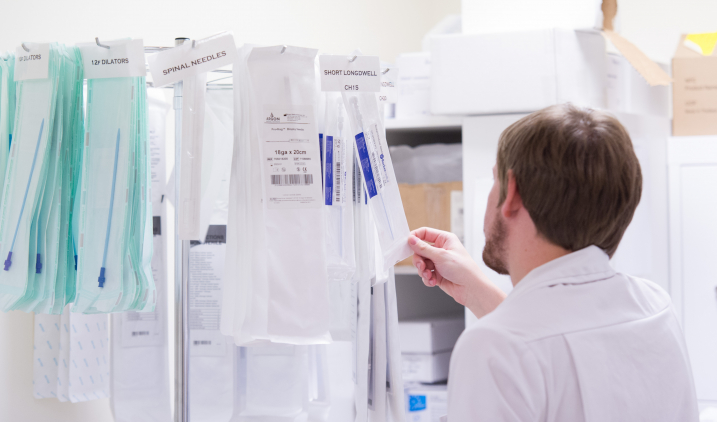Decontamination science (sterile services and flexible endoscopy)
Decontamination technicians (also known as sterile services technicians or endoscopy technicians) ensure medical devices are properly cleaned, disinfected, and sterilized between clinical procedures to prevent healthcare-acquired infections

Life in sterile services and flexible endoscopy decontamination units
Medical devices are used in many different areas of the NHS including operating theatres, endoscopy clinics and wards. You’ll process a wide range of devices including:
- Flexible endoscopes – for diagnostic and therapeutic procedures
- Orthopaedic – for joint replacements, hips/knees and spinal procedures
- Ophthalmic - for cataracts, squints procedures
- Maxillofacial – for nose, ear and neck procedures
- General – abdominal, hernias,
- Robotic devices – for a wide range of procedures
As part of your training, you’ll learn their names and how they are used. Each stage of the decontamination process will be electronically recorded so there is a complete ‘track and trace’ of every medical device in decontamination units.
You’ll always wear personal protective equipment as medical devices may contain blood, body tissue and fluids. You'll also be involved in training apprentices and new members of staff within the department.
As part of an automated process to clean, disinfect and sterilise the medical devices, you’ll also ensure that devices are correctly identified, labelled and checked so that they can be safely used during procedures with patients.
Upon completion of your training, and a period of supervision to assess your skills, you’ll work under limited supervision while following standard operating procedures and national guidelines.
Stephen Aird
Senior technician, central decontamination unit
Part of my job is training new technicians. It is a great feeling seeing your trainee progress.
How much can I earn?
You will be employed on a national pay and conditions system called Agenda for Change (AfC).
There are nine pay bands and below are examples of the pay band you will be on, depending on your role within decontamination
- Decontamination apprentice/ Technician (Healthcare science assistant – Bands 2 and 3)
- Decontamination Technician Supervisor (Healthcare science associate – Band 4)
- Senior Decontamination Supervisor (Healthcare science practitioner – Band 5)
- Decontamination Deputy Manager /Decontamination Quality Manager (Clinical scientist – Band 6/7/8a)
- Decontamination Manager/Decontamination Lead (Consultant clinical scientist – Band 8a-d)
How about the benefits?
- Make a difference
- Reduce the risk of a patient contracting a hospital acquired infection
- Flexible and part-time working as many departments are 24/7
- Work anywhere in the world
- Excellent pension scheme
- Good holiday entitlement
- NHS discounts in shops and restaurants
- Career progression from apprentice to management
Must-have skills
- Communication skills including being able to read and write English
- Attention to detail
- Ability to follow quality management systems and departmental standard operating procedures
- Emotional resilience, a calm temperament and the ability to work well under pressure
As you progress your career, further skills will be needed:
- Ability to manage a wide range of relationships with departmental and clinical healthcare colleagues.
- Teamwork and the capacity to lead multidisciplinary teams.
- Problem-solving and diagnostic skills
- Outstanding organisational ability and effective decision-making skills
- First-class time and resource management for the benefit of patients
How to become a technician in decontamination
To become a technician, you’ll be expected to complete a BTEC Diploma in Healthcare science Assistant (level 2) qualification and the department induction training programme.
If you wish to progress your career, qualifications include:
- the Institute of Decontamination Sciences (IDSc) Technical Certificate (level 3) for Team Leaders/supervisors
- BTEC Diploma in Healthcare Science Associate (level 4).
A Healthcare Science Practitioner level 6 course in decontamation science will be available in 2026.
Entry requirements
Depending on your experience and qualifications, there are several ways to start your career in decontamination:
- Entry level job/level 2 apprenticeship typically need GCSEs 9-4/A-C in maths, English and a science. Induction programmes are available as most people applying for this role will have no previous decontamination experience or knowledge.
- Associate practitioner role will require a BTEC in Healthcare Science assistant (level 2), an IDSc Technical Certificate and the capability to work towards BTEC in Healthcare science associate (level 4)
- A Senior Technician Supervisor or higher role require a Healthcare Science Associate (level 4).
- Management roles will be expected to have achieved a relevant degree and be a Chartered member of the IDSc.
What are my chances of starting a career in decontamination and sterile services?
There are over 200 sterile services departments, over 480 dental practices and approximately 350 endoscopy units using decontamination services. These services are provided by NHS and private providers. There is a national shortage of experienced decontamination management and technicians and therefore this is a good time to start your career in this field. It is rewarding, there is always something new to learn, new innovations on decontamination processes and you need, as a manager, to know about engineering, microbiology decontamination processes as well as the routine management requirements.
Where a career in decontamination will take you
There are career opportunities within decontamination to become Decontamination Unit Managers and Decontamination Leads who are clinical scientists. They will provide organisation wide professional advice and develop the strategic planning. They will have the opportunity to undertake research as part of their role and can be involved in the validation of new digital and electronic medical devices.